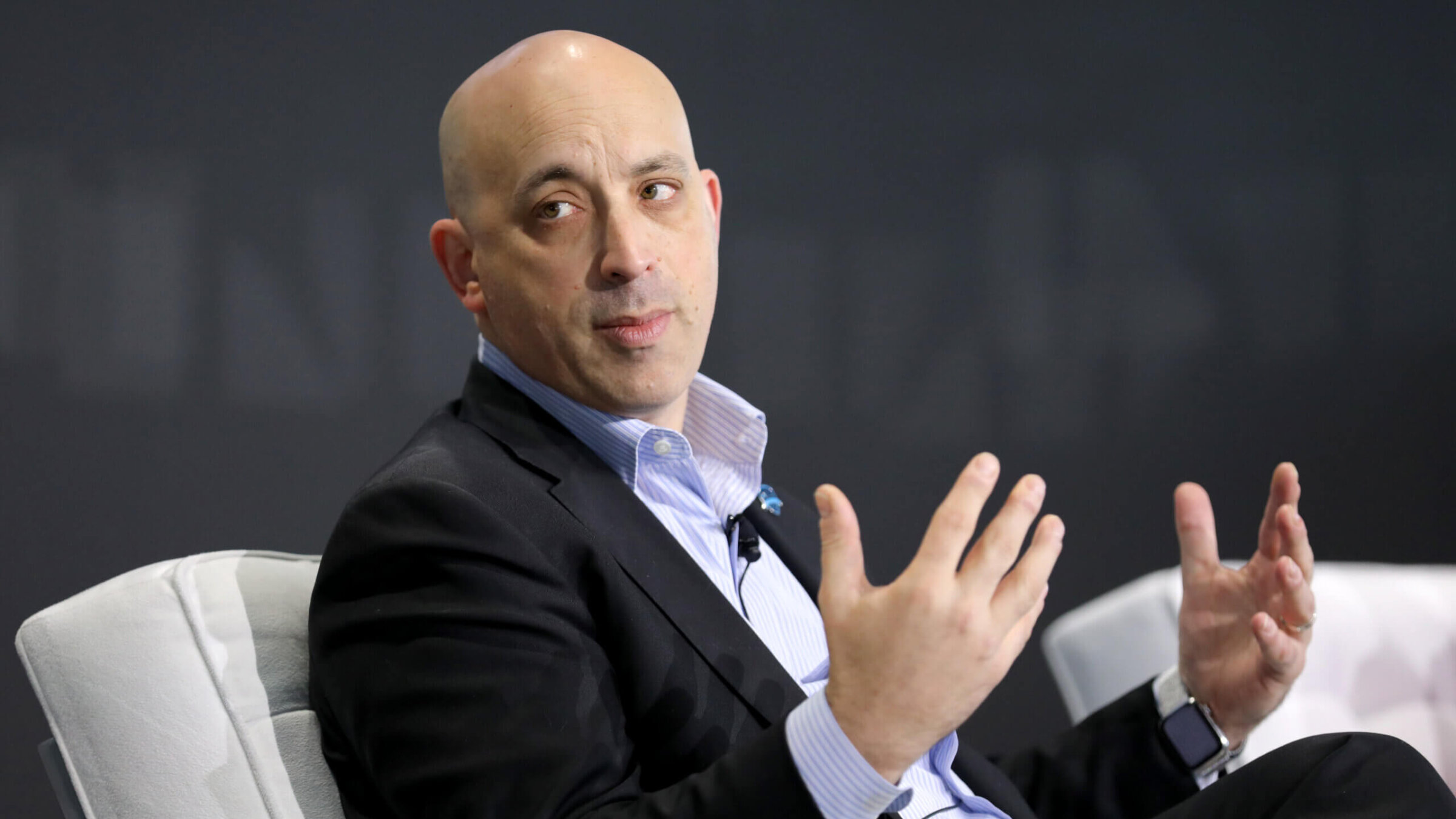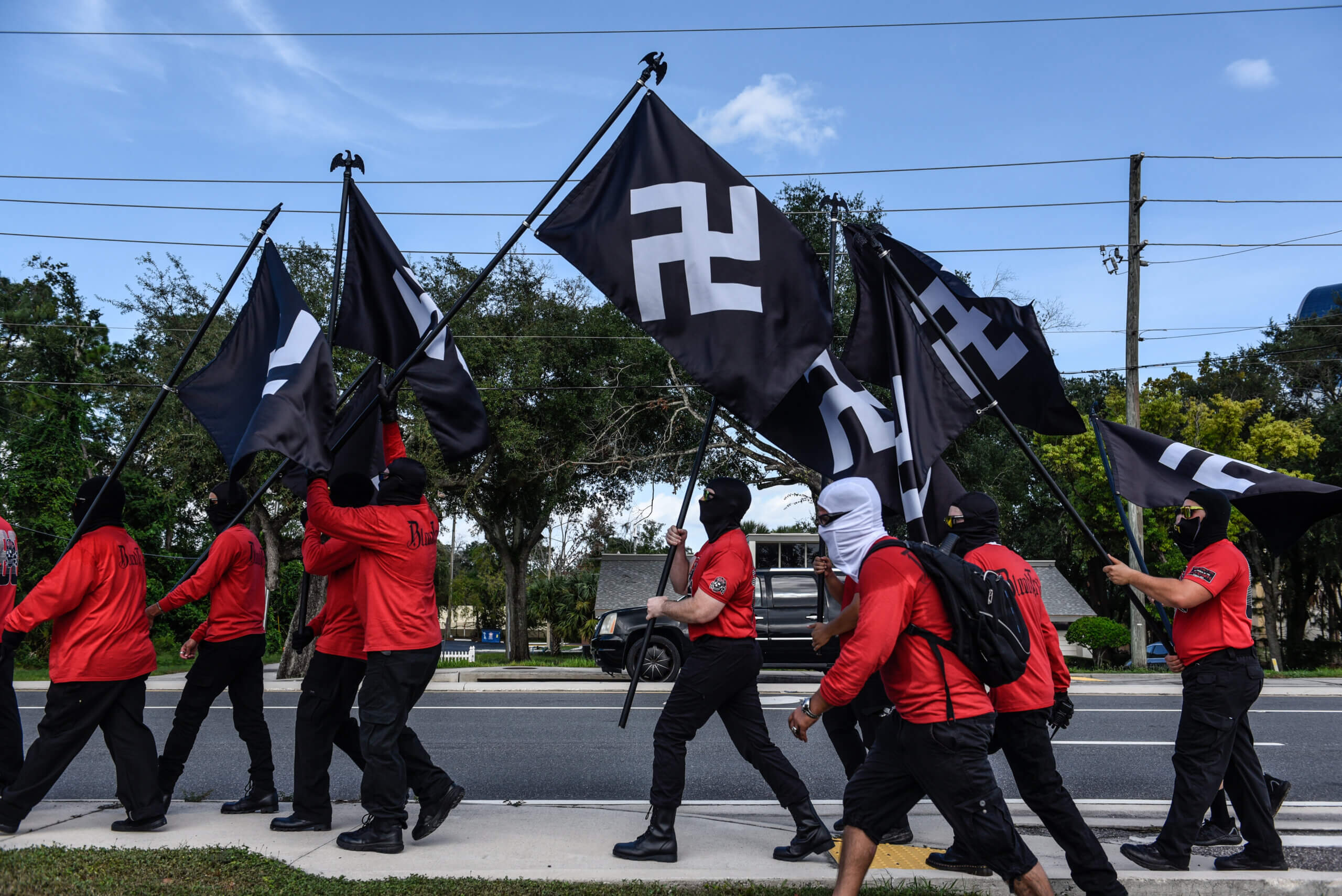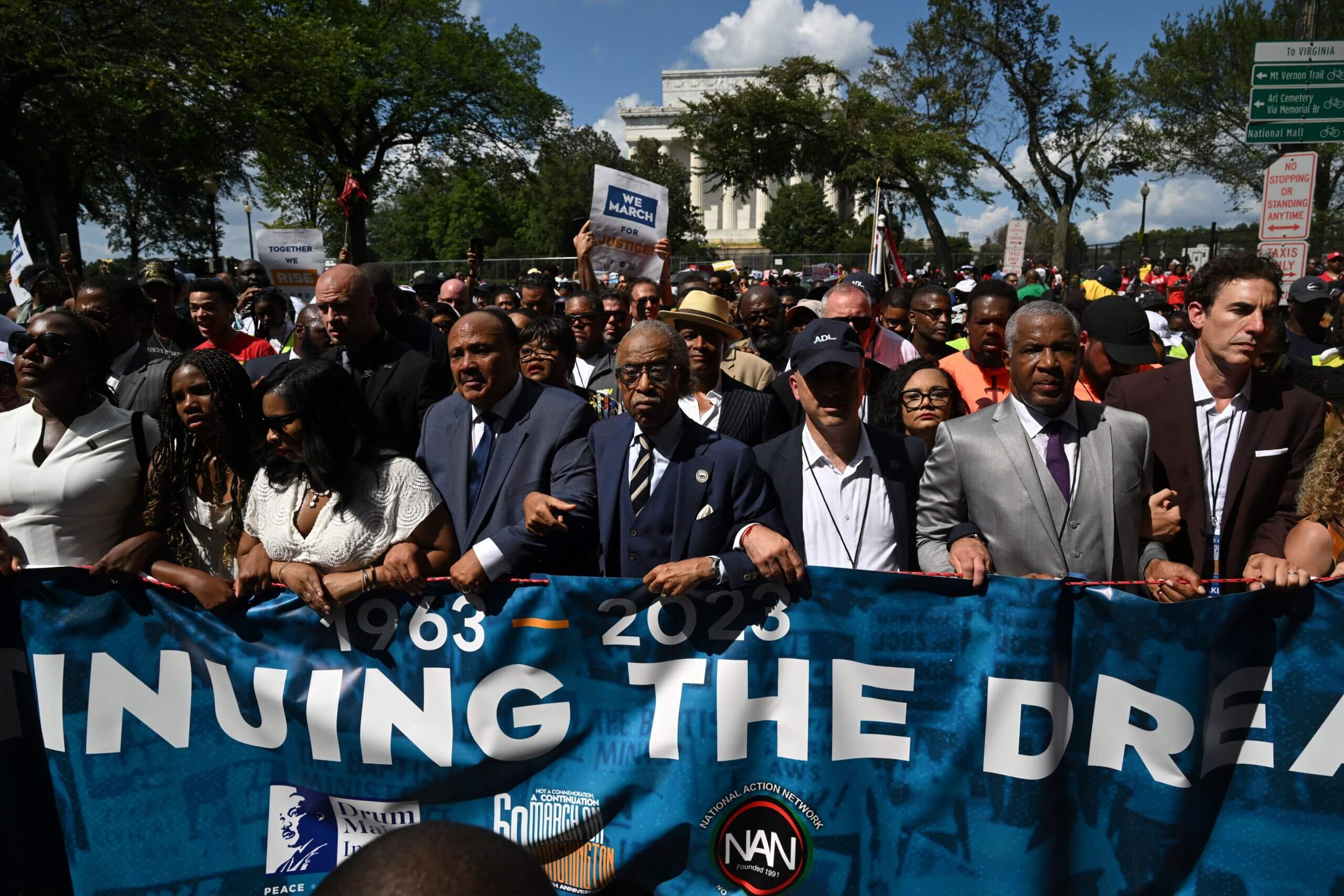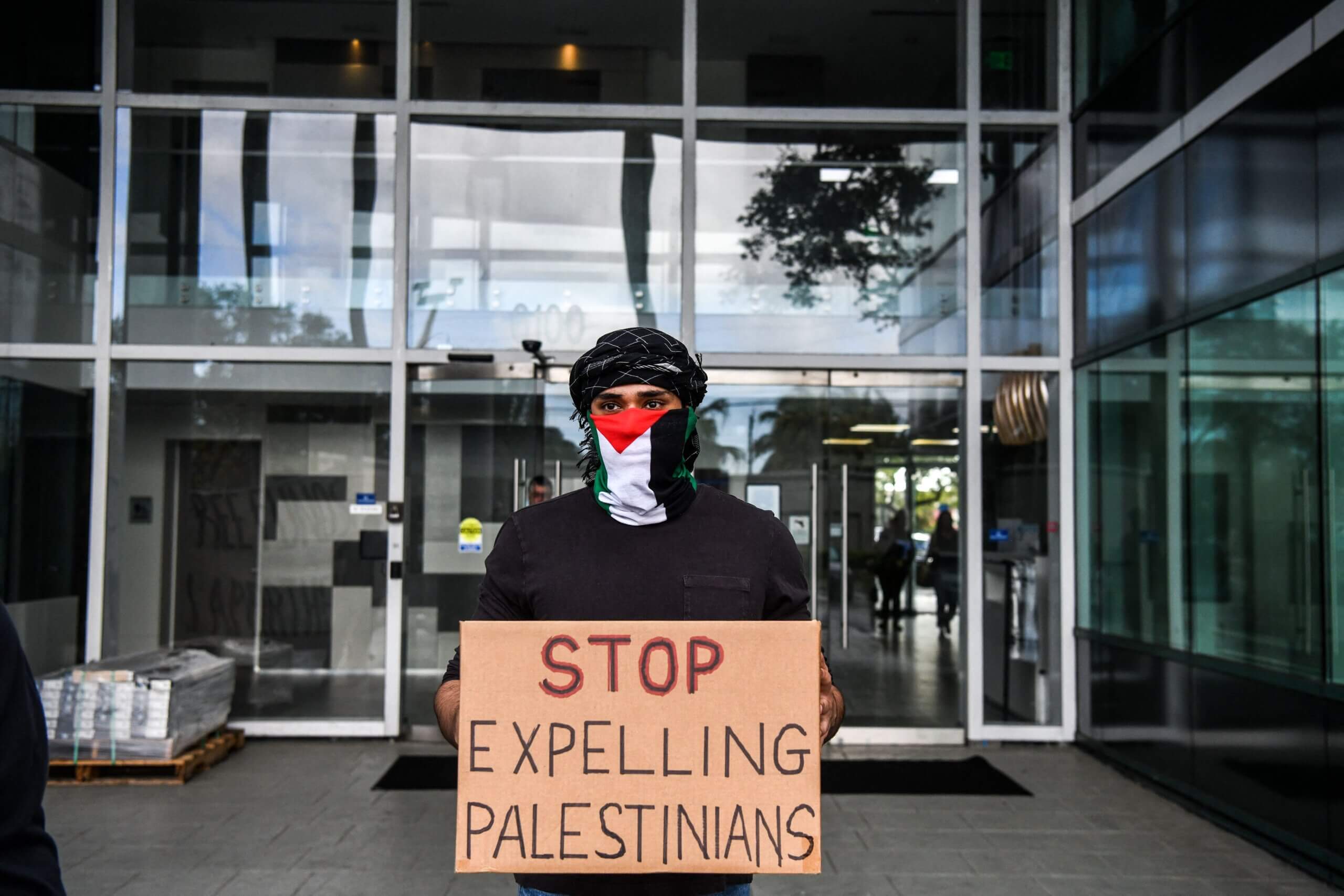Antisemites, right-wingers, progressives … the ADL takes heat from all sides
The Anti-Defamation League is the most prominent organization fighting antisemitism. It’s also fighting a wide array of critics.

Jonathan Greenblatt participates in a panel during the TAAF Heritage Month Summit on May 5, 2023. Photo by JP Yim/Getty Images
The Anti-Defamation League, the leading nonprofit fighting antisemitism, is often itself targeted by antisemites. The current #BanTheADL campaign on social media, for example, is driven by people who have made their hatred of Jews explicit. But criticism of the ADL also comes from other quarters.
Critics from right and left take issue with the ADL’s approach to fighting antisemitism. Some would prefer it focus exclusively on bigotry aimed at Jews rather than, as its 1913 founding mission statement declares, work “to secure justice and fair treatment to all.” Others accuse the group of exaggerating the dangers faced by Jews.
Most of the recent attacks on the ADL reflect the polarized politics of our era, amplified of course by social media — where most of the attacks take shape. The critics generally fall into three distinct ideological categories: white supremacists and other overt antisemites; right-wing Jews and other conservatives who believe the organization is too focused on liberal causes unrelated to antisemitism; and left-wing Jews and others who believe the ADL is too harsh on Palestinian activists, including anti-Zionists, and too supportive of law enforcement.
Despite its many critics, the ADL also appears to have remained broadly popular with American Jews and the general public. Jonathan Greenblatt, its chief executive, has grown the organization’s operating budget from around $60 million when he took over in 2015 to more than $80 million today, and it remains a go-to group for companies, organizations and individuals interested in fighting antisemitism.
Here’s a guide to the ADL’s critics, and its responses to them.
White supremacists
- General problem with the ADL: It’s Jewish
- Conspiratorial tropes: The ADL promotes “Jewish supremacy” and was founded to support a pedophile
- How you might recognize them: Social media and in-person signs calling to #BanTheADL
White supremacists are a frequent target of the ADL, and have made the organization a target of their own — blaming it for various often imagined maladies, from online censorship to peddling drugs and supporting pedophilia.
Keith Woods, an Irish white nationalist who has referred to himself as a “raging antisemite,” launched the latest #BanTheADL campaign last month on X, the social media platform formerly known as Twitter. The campaign has been endorsed by Elon Musk, who owns X.
“They view the ADL as an extension of the larger Jewish community,” Oren Segal, who runs the ADL’s Center on Extremism, said of white supremacists.
White supremacists sometimes make nods to criticism espoused by more mainstream voices, like concerns that the ADL is too quick to accuse people of antisemitism.
“It is not ‘antisemitic’ to want to #BanTheADL,” Woods wrote on X Tuesday. “The ADL has expanded its definition of antisemitism and ‘hate’ so broad as to be meaningless.”

But elsewhere they rely on explicit antisemitism and antisemitic dog whistles, including suggestions that ADL is holding Musk “ransom” and engaging in financial “blackmail” against social media companies.
“These Jewish supremacists are losing their f—– minds and have no idea what to do,” Lucas Gage, another antisemitic social media influencer, wrote on X this week.
Greenblatt, the ADL’s director, called Musk’s engagement with the #BanTheADL campaign “profoundly disturbing.”
“This behavior is not just alarming nor reckless,” Greenblatt said in a statement Tuesday. “It is flat out dangerous and deeply irresponsible.”
The ADL said that some of the recent threats phoned into synagogues were tied to an effort to force the organization off of X, Facebook and other social media platforms.
Figures like Gage also accuse the ADL of supporting “pedophiles.” That stems from the fact that it was founded in 1913 amidst the trial and subsequent lynching of Leo Frank, the Jewish factory superintendent who was found guilty of the rape and murder of a 13-year-old employee. Historians widely believe that Frank was innocent and that his conviction was motivated by antisemitism.
But the “pedophile” slander has become more popular in recent years as the far-right has weaponized accusations of “grooming” and pedophilia in recent years. A neo-Nazi group demonstrated outside Parade, a Broadway play about the Frank case, earlier this year.
The ADL has been the target of wild conspiracy theories before. In 1992, for example, supporters of the far-right, fringe presidential candidate Lyndon LaRouche published The Ugly Truth About the Anti-Defamation League, a book claiming that the group was the “leading agent” behind the “scourge of drugs, dirty money, and New Age perversion” in the United States.
While some more moderate critics of the ADL have joined in the #BanTheADL campaign, most keep their distance from these overt antisemites.
Elsewhere on the right
- General problem with the ADL: It’s too liberal
- Specific accusations: The ADL is too critical of conservatives, the ADL doesn’t focus enough on “woke antisemitism” and anti-Zionism, the ADL spends too much time on civil rights causes unrelated to Jewish safety
- Organizations you might recognize: Americans for Peace and Tolerance, the Jewish Leadership Project
Beyond the world of white supremacists, there is a segment of the political right — including many Jews — who believe the ADL has drifted too far to the left. These critics frame their complaints in a variety of ways.
Organizations like Americans for Peace and Tolerance, a Boston-based advocacy group founded in 2008, have accused the ADL of prioritizing the fight against Islamophobia over the protection of Jews.
“ADL policy is driven not by Jewish needs for self-defense, but by the organization’s left-wing policy agenda,” the group wrote in a 2019 blog post. “Perhaps the organization should now be called ‘Al-Defamation League.’”

Many Jewish leaders have shunned Americans for Peace and Tolerance and its founder, Charles Jacobs, for their hostile attitude toward Muslims, though they are part of some coalitions including the Combat Antisemitism Movement.
The Jewish Leadership Project was founded two years ago by some of the same people involved in Americans for Peace and Tolerance, largely to attack leading Jewish organizations including the ADL, for their focus on “white supremacists and neo-Nazis,” rather than antisemitism from immigrants and “radical Arabs.”
“The ADL Has Corrupted Its Mission and Betrayed the Jewish Community,” the group’s founders wrote in an op-ed published last year in Newsweek.
Other conservatives focus on the fact that Greenblatt served in the Obama administration, and accuse him of being a lackey for the Democratic Party who unfairly classifies much conservative rhetoric as hateful.
Jonathan Tobin, editor of the conservative Jewish News Syndicate, is a frequent critic of the ADL. In December, Tobin declared that the ADL was “on the wrong side of the fight for democracy,” accusing the group of working with Twitter’s previous owners to silence right-wing voices.
“Taking a cue from its liberal and partisan Democratic allies,” he wrote, “the prominent Jewish organization seems to think there’s something fishy about free speech.”
Conservative pundits like Tobin also lament the fact that the ADL is part of coalitions on issues including voting rights, immigration reform and racial justice. Fox News hit the ADL last year for including support for racial justice and trans rights in the educational materials it provides to schools.
“By focusing increasingly on the battles of the Democratic Party, and by weighing in on matters far removed from its traditional mandate, the ADL is leaving American Jews behind,” Liel Leibovitz, a right-wing columnist for Tablet, wrote in the Wall Street Journal after the ADL came out against Brett Kavanaugh’s nomination to the Supreme Court in 2018.
From the left
- General problem with the ADL: It’s too supportive of Israel
- Specific accusations: The ADL wants to silence Palestinian activists, is racist and does not genuinely support civil rights
- Campaigns and organizations you might recognize: #DropTheADL, Deadly Exchange, Jewish Voice for Peace, US Campaign for Palestinian Rights, American Muslims for Palestine
A coalition of progressive groups started the #DropTheADL campaign in 2020 with the goal of convincing left-wing groups that they should not work with the organizations or join coalitions that include it. It has since been endorsed by more than 200 mostly obscure groups, as well as some more prominent ones including: American Friends Service Committee, the Council on American-Islamic Relations, Democratic Socialists of America, IfNotNow, Jews for Racial and Economic Justice, Jewish Voice for Peace and the National Lawyers Guild.
The campaign contends that the ADL supports “racist, militarized policing,” unfairly smears pro-Palestinian activists as antisemites by equating anti-Zionism with antisemitism, and in the past has facilitated the surveillance of leftist movements.
“The Anti-Defamation League has branded itself as a civil rights organization in ways that conceal and legitimize its right-wing activities undermining the rights of Black, immigrant, queer, Muslim, Arab, and other marginalized communities,” organizers of #DropTheADL wrote on their website.

In 2018, the anti-Zionist group Jewish Voice for Peace launched Deadly Exchange, a campaign calling on local governments and federal agencies to stop police exchanges with Israel. Some of these programs, in which U.S. law enforcement agents learn counterterrorism tactics from Israelis, are backed by the ADL.
“There are countless ways the ADL has fueled Islamophobia for decades — from surveillance to smear campaigns – and their attacks on Muslim communities in the U.S. are far-reaching,” Jewish Voice for Peace wrote in a blog post. “The ADL often places its concerns for the Israeli government above its concerns for human rights.”
How has the ADL responded?
The ADL has two distinct tacks to address critics and criticism — dismissing them as broadly illegitimate or dispelling them point by point, as seen in an FAQ section of its website.
Sometimes it does both at the same time.
“Many of the myths we address often come from the same sources that have made it their crusade to disparage ADL’s work,” the organization wrote. “Furthermore, many of these false accusations are made simultaneously by both extreme sides of the ideological spectrum.”
Yair Rosenberg, writing several years ago in Tablet, argued that the range of ADL’s critics was evidence that it avoided the partisanship that often shapes other Jewish groups.
“No one can accuse them of shirking from the fray or playing politics with their principles,” Rosenberg wrote. “That’s unfortunately more than can be said of many other groups that act in the Jewish political space, which too often ignore or even cover for prejudice among their allies.”
Still, they have acted on some of the criticism. After Fox News aired a report questioning the content of the ADL’s education materials on racial justice, LGBTQ+ rights and related issues, the organization undertook an internal investigation. The investigation, which is ongoing, was prompted in part by what the New Republic reported last month was pressure from right-wing donors.
The ADL also reportedly considered ending its involvement in the Israeli police training targeted by the Deadly Exchange campaign, but ultimately decided to continue the program.
Correction and clarification, September 11, 2:30 p.m.: An earlier version of this article incorrectly stated that Leo Frank was lynched in 1913. He was arrested, tried and convicted in 1913, but the lynching took place in 1915. The article also stated the Anti-Defamation League was created “in response” to the Frank case. While ADL’s founding in 1913 coincided with the case against Frank and spurred its growth, the organization has said the case was not the impetus for its creation.






















